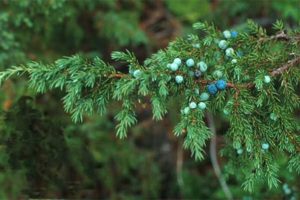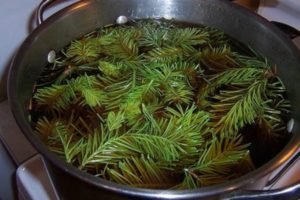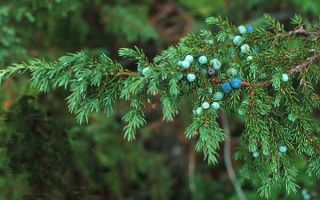Content
- 1 What does a juniper look like and where does it grow?
- 2 The chemical composition of juniper
- 3 Useful properties of juniper
- 4 Is juniper possible during pregnancy and breastfeeding
- 5 At what age can juniper be given to children
- 6 Benefits of berries, root and juniper bark
- 7 Juniper Recipes in Traditional Medicine
- 8 Useful properties and uses of juniper essential oil
- 9 The use of juniper in cosmetology
- 10 The use of juniper berries in cooking
- 11 Juniper products
- 12 When and how to harvest juniper
- 13 Harvesting and storage of juniper
- 14 Contraindications and possible harm to juniper
- 15 Conclusion
The healing properties of juniper have been noticed for a long time. People called this perennial plant differently, so another common name is veres. It will be useful for a modern person to learn about its unique and useful properties.
What does a juniper look like and where does it grow?
In large forest areas, a coniferous shrub - juniper grows. It grows up to three meters. You can find this plant in the regions of the Northern Hemisphere, sometimes in North Africa and Asia. A temperate and tropical climate is suitable, and prefers to be located on dry slopes. Veres has a straight trunk and spreading branches with thorny needles. Juniper fruits look like scales that form small cones. The color of the berries changes from green to brown.

The chemical composition of juniper
The rich chemical composition gives the plant useful properties. The substances in its composition are well studied. The fruits, needles and roots of this plant contain the following useful components:
- Flavonoid.
- Glycoside.
- Bitterness.
- Essential oils
- Resin.
- Organic acids.
- Pectin.
- Tanning particles.
- Camphor.
Useful properties of juniper
Veres ordinary has a wide range of useful actions, and therefore for a long time its use has been practiced for medical purposes. Why is juniper useful for women's and men's health:
For women
Medicinal tincture on juniper has a beneficial effect on the pelvic organs, increasing blood flow and normalizing the menstrual cycle. Decoctions are used for various infectious inflammation of the vaginal mucosa. During menopause, it will be useful to carry out aromatherapy based on this plant.
For men
Veres is famous for its effective action in diseases of the genitourinary system. A properly prepared broth will help in the fight against urethritis, and will also have a beneficial effect during infectious prostatitis. The plant is used as a complex therapy for prostate adenoma.
Is juniper possible during pregnancy and breastfeeding
It is forbidden to use heather products during pregnancy, as this can lead to uterine contractions and even provoke a stillbirth. During lactation, reception is also undesirable, because the child's body can react badly to the plant.
At what age can juniper be given to children
All products and solutions are allowed for children from five years old, however, it is recommended to consult a doctor before use.
Benefits of berries, root and juniper bark
Juniper broths are prescribed as sedatives, diuretics, disinfectants, bactericidal and anti-inflammatory agents. In addition, the plant increases appetite and eliminates bouts of nausea, purifies the blood, strengthens the immune system.
An active diuretic and anti-inflammatory effect is required for diseases of the genitourinary system. In the case of cystitis, the beneficial properties of the juniper berry will be irreplaceable. You can also restore kidney function and cleanse the genitourinary system of sand and small stones with the help of tinctures and other compositions from the plant. It is impossible not to mention the regenerating properties, thanks to which prolonged internal bleeding can be avoided. In the fight against edema, it will have a diuretic effect.
Medicines based on the bark of this plant gently affect the walls of the stomach, restoring the normal process of digestion, intestinal peristalsis and the production of enzymes. And the tannins in its composition have an astringent effect, eliminating indigestion. The plant also affects smooth muscle and receptors to stop nausea.
The root of heres is useful for nervous disorders and mental overload. The ingredient composition brings significant relief, relieving symptoms of depression and stress. This is possible due to the production of serotonin and the normalization of the functioning of the nervous system.

Juniper Recipes in Traditional Medicine
Depending on the disease that struck the human body, the use of preparations based on a coniferous plant is shown.
Diseases of the pulmonary system
You will need 1 tablespoon of dried fruits and two glasses of boiling water. Then, in a water bath or double boiler, you need to boil the composition for half an hour. The solution should be cooled, filtered and water added to the initial result. This juniper tea is very healthy. It should be drunk several times a day.
Sore throat
Grind a teaspoon of dry berries and pour a glass of boiling water. Then insist in a thermos for one hour. Then you need to strain and pour into three portions. Gargle after eating.
Intoxication of the body and blood purification
To do this, you should eat fresh fruits on an empty stomach. Starting with one berry per day, you should gradually increase the dosage to 15 pieces.
Joint pain
To do this, pour 200 grams of needles with a liter of boiling water. Insist for two hours, strain with gauze. Take a juniper bath as needed.

Useful properties and uses of juniper essential oil
Essential oil is often added to a hot bath. This procedure not only brings a beneficial effect in case of emotional or nervous overstrain, but also helps to relieve headaches. Aromatherapy with essential oil is also practiced, which is prescribed for prophylactic purposes against viral diseases.
Providing a strong antiviral effect, the plant destroys harmful bacteria both in the air and on human mucous membranes. During the period of exacerbations or epidemics of various diseases, it will be useful to carry out inhalations with the oil of this plant. To do this, just apply a few drops to the chest and neck. Oil vapor will create a protective barrier preventing infection and contamination.
The use of juniper in cosmetology
Heather-based essential oils are suitable for combination to oily skin. By applying juniper for the face, you can achieve skin tone and rejuvenation. You can often find hair products that contain this plant. These beneficial treatments help weak and thin hair.Also, juniper oil is sometimes a component of perfume - it helps to fix odors.

The use of juniper berries in cooking
An extract is made of heres berries, which can be used for the production of an alcoholic beverage. For example, the popular Gin drink is made from a tincture of juniper fruit. But the use of berries for cooking spices is also common. These seasonings go into sausages, giving a spicy and rich taste.
Juniper products
Veres is useful not only in medicine. The wood of this plant becomes more durable over time and is suitable for making various souvenirs, pencils, stands and walking sticks. The shavings go to the production of rollers and massagers, the use of which helps with migraines and diseases of the respiratory system. The juniper pillow helps to improve sleep.

When and how to harvest juniper
The fruits from this tree begin to be harvested after full ripening. That is, they must have a blue-black color. The collection takes place at the end of August and lasts until the end of October. A thick cloth or paper is spread under the bush, a tree is frightened and useful berries are collected.
Harvesting and storage of juniper
You can dry the plant only in a special dryer, and store it in a dark place and in high-quality wooden dishes that close tightly.
The needles can be harvested all year round.
Contraindications and possible harm to juniper
The substances that make up this plant have a pronounced effect on the human body. For this reason, it is not always allowed to use both the plant itself and the compositions prepared on its basis.
There are a number of contraindications in which the use of heres can do more harm than good:
- Chronic liver disease.
- Kidney disease, in which the functioning of the ureters is impaired.
- Chronic and severe disorders of the gastrointestinal tract.
- Hypertensive disorder.
- Use during pregnancy and lactation is strictly prohibited.
- Children under five.
- Individual intolerance to juniper.
In addition to the listed contraindications, it should be borne in mind that it is not recommended to use preparations and tinctures based on this plant for a long period of time. Treatment or preventive measures can last a maximum of two months. If, according to the doctor's prescription, a longer period of treatment is required, then you should constantly monitor the patient's condition and periodically donate blood for analysis.
It is dangerous to prescribe medications based on this plant on your own. It is advisable to consult a doctor. The effect of such drugs is very strong, so it is extremely important to monitor the dosage and duration of administration.
Conclusion
More information about the benefits and dangers of juniper can be found in this video:
Due to the variety of medicinal actions, the coniferous tree is common in many countries, and its use is practiced in various fields of medicine. Very often, the plant is part of a complex therapy that promotes recovery and cleansing of the body.

